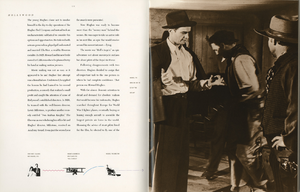Search the Special Collections and Archives Portal
Search Results

Transcript of Jim Gans by Claytee D. White, January 20, 2013
Date
Archival Collection
Description
Text
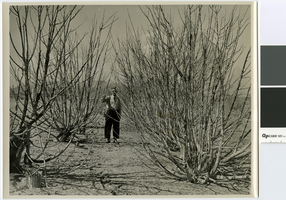
Photograph of a St. Thomas resident standing near dry hedges, 1945
Date
Archival Collection
Description
Hedges in St. Thomas
Transcribed Notes: Transcribed from photo sleeve: "Hedges planted by prosperous residents of St. Thomas. The trees in this photograph were under more than 50 feet of water for a period of about 7 years."
Image
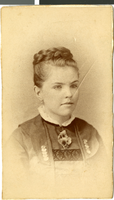
Photograph of Cressa Spring Hancock, Iowa City, Iowa, circa 1882
Date
Archival Collection
Description
Image
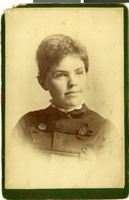
Photograph of Cressa Springer Hancock, Iowa City, Iowa, September 9, 1885
Date
Archival Collection
Description
Image
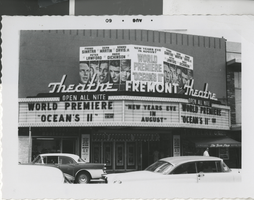
Photograph of the Fremont Theatre marquee advertising "Ocean's 11," Las Vegas (Nev.), August 1960
Date
Archival Collection
Description
Image
Series II: Ronzone Family History Materials, 1900-1991
Level of Description
Scope and Contents
Series II provides a history of the Ronzone family, mostly through newspaper clippings and photographs. Thirteen black and white photographs depict scenes in turn-of-the-20th- century mining towns in Alaska, possibly including Nome and Sitka. Bertha and her husband A. B. "Ben" Ronzone were originally in Alaska during the gold rush between 1900 and 1904 before they came to Nevada; these pictures were taken just after that time. Six other photographs in this series feature Ann, Dick, and Bertha Ronzone in social and other contexts. There are also newspaper clippings about Bertha Ronzone and the rest of
the family, telling the story of their pioneer years in central Nevada and their migration to and success in Las Vegas. Finally, there are various obituaries for Dick Ronzone, a list of possible Ronzone relatives, and some personal programs and ephemera from funeral and other personal events.
Archival Collection
Collection Name: Ronzone Family Papers
Box/Folder: N/A
Archival Component

Lawrence Chiu Hill oral history interview: transcript
Date
Archival Collection
Description
Oral history interview with Lawrence Chiu Hill oral history interview conducted by Cecilia Winchell, Nessa Concepcion, and Stefani Evans on November 8, 2021 for Reflections: The Las Vegas Asian American and Pacific Islander Oral History Project. Lawrence "Larry" Chiu Hill shares his experiences growing up in Taiwan and immigrating with his family to South America, then moving to Corpus Christi, Texas, and finally Las Vegas, Nevada. He discusses his education at University of Nevada, Las Vegas as a Political Science graduate and his career path moving from casino gaming into the practice of law. Lawrence manages his own firm, Lawrence C. Hill and Associates, and talks about his work, his family, and the community he has created in over two decades of living in Las Vegas.
Text
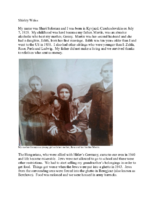
Biographical essay by Shirley Weiss, 2014
Date
Archival Collection
Description
Shirley Weiss describes her childhood housed in army barracks in the ghetto in Beregszasz (Berehove), Hungary. She was sent to Auschwitz-Birkenau, and several other camps, and eventually liberated from Terez?n in 1945. She came to the United States via Sweden.
Text

Transcript of interview with Ralph Denton by K.J. Evans, approximately 1999-2000
Date
Archival Collection
Description
On an unknown date (likely 1999-2000) and time, K.J. Evans interviewed Ralph Denton, an adviser to former Governor Grant Sawyer and political figure in Nevada for many years. Denton first talks about his personal friendship with Sawyer, their education in law school, and his eventual work on campaigning for and working with Sawyer after he became governor. Denton then explains the controversy regarding Denton’s accepting of complimentary services (comps) at hotels. He later describes his work as a Clark County Commissioner and then talks about working as district attorney in Esmeralda County, Nevada. Denton then talks about the influences that led him to be interested in a career of law and later speaks more about working with Grant Sawyer, specifically about serving as his adviser, afterwards providing the argument on why he believes Sawyer was the greatest governor of Nevada. Toward the latter part of the interview, Denton describes his work on improving civil rights and some of the challenges that came with that. The two also discuss how the practice of law has changed over time. To conclude the interview, Denton describes his experience in running for governor and how he would have served as governor if he had been elected.
Text

